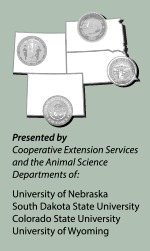Limit-feeding Cows in Confinement Using Crop Residues
by Kindra Gordon, field editor, Angus Journal
RAPID CITY, S.D. (Dec. 3, 2013) — As grazing lands have become less available, either due to drought or because of urbanization or conversion to cropland, producers might consider feeding cows in confinement for a period of time, suggested Karla Jenkins as she addressed attendees at the Range Beef Cow Symposium in Rapid City, S.D., Dec. 3. Jenkins is a range management cow-calf specialist with the University of Nebraska at the Panhandle Research & Extension Center in Scottsbluff.

“We used to think grass was the cheapest place for gains, but that has changed,” said Karla Jenkins, NU range management cow-calf specialist at the Panhandle Research & Extension Center in Scottsbluff.
She and her colleagues have been conducting studies to learn more about limit-feeding cows in confinement. She stressed that limit-feeding means you want the animals to maintain weight, not gain weight.
Particularly as the industry faces drought recovery of pastures and higher grazing costs, Jenkins said, “Producers may need to rethink their utilization of grass and think outside the box as they look at different possibilities.” She suggested confinement may become a part of a producer’s system and provide opportunities to save high-quality grass for gains. She added, “We used to think grass was the cheapest place for gains, but that has changed.”
For those who utilize limit-feeding in confinement, Jenkins said there are some key considerations. They include:
- Knowing the nutrient content of feedstuffs, which can be tricky with byproducts. She encouraged using total digestible nutrient (TDN) values produced by universities for feeding trials. Extension personnel can assist in helping develop a diet.
- Understanding the nutrient requirements of cows. The cow’s needs will change depending on stage of gestation or lactation, and if she has a calf at her side the diet will need to be adjusted to account for the feed the calf consumes, too.
- Recognizing that byproducts don’t always have to mean ethanol. She suggested looking at other regionally available byproducts, such as beet pulp for producers in Western Nebraska. If a feedstuff is seasonally available, it might be an opportunity to bag and store it until it is needed for feed, as well.
While the cow confinement studies that Jenkins is involved with are in their second year, she reported that from the first year of data they have not seen differences in performance between early-weaned and late-weaned pairs, between weaning weights of calves, body condition scores of cows, or pregnancy rates of cows.
Jenkins spoke Tuesday at RBCS XXIII. Visit the Newsroom at www.rangebeefcow.com/2013 view her PowerPoint, read her proceedings paper or listen to her presentation.
---------------------
The RBCS is a biennial educational symposium offering practical production management information. It is sponsored by the Cooperative Extension Service and animal science departments of the University of Wyoming, South Dakota State University, Colorado State University and the University of Nebraska.
Comprehensive coverage of the symposium is available online at www.rangebeefcow.com. Compiled by the Angus Journal editorial team, the site is made possible through sponsorship of LiveAuctions.tv and the cooperation of the host committee.
Editor’s Note: This article was written under contract or by staff of the Angus Journal. To request reprint permission and guidelines, contact Shauna Rose Hermel, editor, at 816-383-5270.


